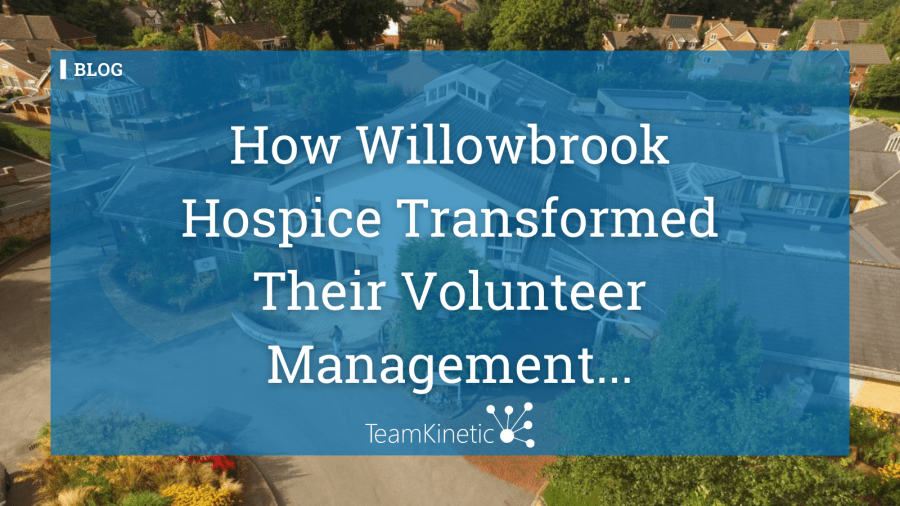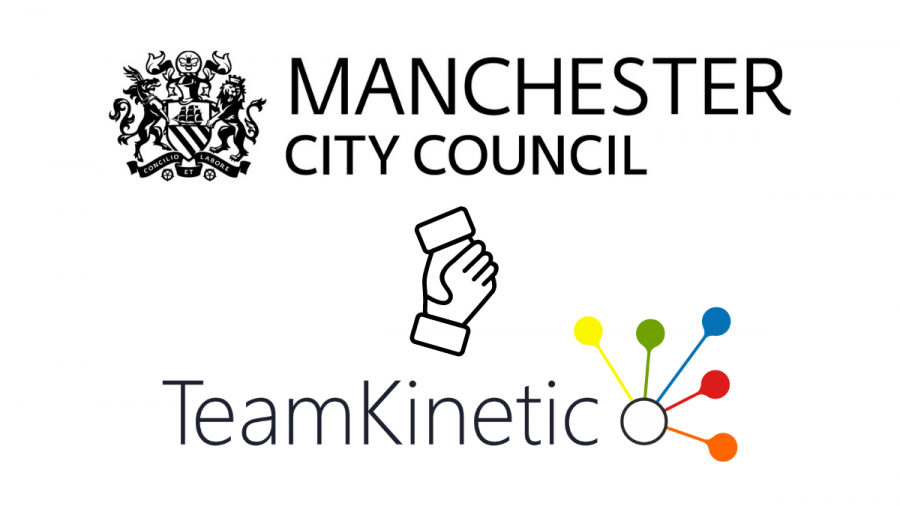The majority of work we refer to in Willowbrook Hospice’s case study is based on figures and interviews from the year 2020. This data has then influenced the extra research conducted in the hospice sector.
It is also worth noting that these figures are taken from the beginning of COVID-19 pandemic and with fewer people volunteering, the activity on the system we’ve recorded has been limited.
Before TeamKinetic
We’ve previously spoke to Willowbrook Hospice’s volunteer manager, Bev, about how they managed volunteers before TeamKinetic and what it was that made Willowbrook decide to look into a volunteer management system.
Before TeamKinetic, they were managing volunteers through an access database described by Bev as an “archaic system”- with no way of contacting volunteers. With the access database, they’re was no opportunity for interaction and Bev realised that they needed something that would better manage their volunteers.
They realised they needed something web-based that can be accessed from anywhere. The system previously in use was linked to the NHS SHK system, it couldn’t be accessed at any time or place. Willowbrook decided they needed something shop managers could also use; this when they decided to start looking for a volunteer management system and came across TeamKinetic.
Moving to TeamKinetic and Implementation
Willowbrook Hospice chose TeamKinetic after seeing how local we are, watching a number of videos on our YouTube channel and speaking with our Director of Sales, Chris.
At TeamKinetic, we are constantly changing and adapting to suit our customers needs. This was another factor that “sold” us to Willowbrook – they knew if they ever suggest anything, we will take it on board and look into adapting the system to include this.
Regarding implementation, Bev openly mentioned that they needed “lots of planning”, but Steve, our Implementation Consultant, helped with all their planning needs. Willowbrook has numerous shops and with the way they manage their volunteers, it helped them to have a staged way of implementing the system.
They started with one shop first, and shop by shop they managed to get all their volunteers on board. Bev even mention that COVID-19 helped them in some ways; having shops closed gave them the time to fully roll out the system to the volunteers. Joining TeamKinetic also allowed them to have a “data cleanse” – speaking to volunteers who didn’t want to volunteer anymore. With a new system, Willowbrook now know that the volunteers they have registered are the ones who are active and want to volunteer.
COVID-19
COVID-19 affected everyone, including Willowbrook Hospice. While we’ve has multiple lockdowns, the Hospice’s nine shops have been closed during those times . The pandemic also meant that the fundraising team at Willowbrook had to come up with ways to ensure they came up with COVID-19 safe fundraising events. So, having TeamKinetic really helped them with managing their volunteers during COVID-19 safe events. This is what Bev had to say about using TeamKinetic for one of these events:
We had an event that came up where we could sell things in a local Garden Centre. It’s something we had to implement quite quickly because it was over Christmas and the garden centre had told us that if we wanted a stall to sell our Christmas cards and other things then we could. So within half an hour, I had created it on TeamKinetic and had it emailed out to all the volunteers. I would say within the hour, we filled up all the slots for two weeks worth of people volunteering for it. I think that raised over £2,000; without TeamKinetic that would never have happened.
Bev Neilson, volunteer manager at willowbrook hospice
As well as events, from a communication point they were able to stay in contact with volunteers throughout every stage of the pandemic; something that was very important to them. Before TeamKinetic, staying in touch with volunteers was “virtually impossible” and would have involved bulk emails which never worked because the NHS system was too slow for them. Now, they can email and text volunteers from one system with a click of a button.
In addition to this, having the TeamKinetic system available to them during the pandemic allowed them to set up a ‘befriending system’ between the volunteers. From this, they have been able to keep volunteers in touch with each other, solely from the private notes function on the TeamKinetic system.
Willowbrook’s Volunteering by Index of Mulitple Deprivation Rank (IMDR) For All Volunteers Registered Since 2020
This graph shows the number of Willowbrook Hospice volunteers by decile. That is the number of volunteers with a home postcode that is ranked using IMDR.
1 = bottom-ranked postcode area in bottom 10% ranked area of England
10 = top-ranked postcode area in the top 10% ranked area of England

These figures are interesting to see as volunteering is typically viewed as a traditionally middle-class activity. A report by NCVO supports this, as their statistics show 48 per cent of those who volunteered in the last 12 months have a degree compared to 20 per cent who have no qualifications. Some 42 per cent of unemployed people have never volunteered, compared to 21 per cent of those who work part-time.
This is of course also impacted by the fact that Greater Manchester has more postcode areas that fall into the bottom 50% according to the IMDR rank. Despite this factor, I believe it is captivating that despite these statistics, Manchester shows that poverty is not a defining factor in their willingness to volunteer.
When looking at this graph, it shows that Willowbrook has been able to recruit and retain volunteers from all different postcode ranks in England. Showing their inclusivity in welcoming all volunteers into their volunteering programme.
Age
As evidence shows, volunteering is often found to be a pursuit of older individuals. This typically comes from them having more spare time to volunteer than others. Although Willowbrook’s figures around age profiles accurately represents this statement, their figures also show the rising ability to recruit younger volunteers. This comes from the use of TeamKinetic as their volunteer management system. We are able reduce barriers into volunteering, especially for younger volunteers who are digitally engaged through TeamKinetic. We also allow for a quicker and easier recruitment process, something that is favoured in young people volunteering.

Gender
Stereotypically, data from the voluntary sector normally suggests a divide of 60% female volunteers and 40% male volunteers. Linking to this, evidence and research online also suggests a gender split in hospice volunteering with far more female volunteers over male volunteers is common.
Therefore, these figures from Willowbrook are not surprising with over 3/4 of volunteers being female. Despite this, Willowbrook Hospice does demonstrate inclusivity in volunteers with a range of female, male, transgender, and non-binary volunteers getting involved in hospice volunteering. This shows the TeamKinetic system is successful in ensuring anybody can register to be a volunteer as however they identify, allowing further inclusivity in the voluntary sector.

Opportunity Data
Volunteers recorded 16,007 hours of volunteering in the system from 2020. These hours took place over 49 opportunities.
The top 8 most popular opportunities regarding the number of hours undertaken by volunteers are:
| 1 | Retail |
| 2 | Admin |
| 3 | Fundraising Events |
| 4 | Teaching Roles |
| 5 | Reception |
| 6 | Gardening |
| 7 | Catering |
| 8 | Driver |
As you can see above, the top 8 most popular opportunities is a very diverse range. This shows that since Willowbrook has been using TeamKinetic they have been able to recuit volunteers onto a wide variety of volunteering opportunities. Since Willowbrook Hospice rasies a lot of their funds from their charity shops, it is not a shock to see retail at the most popoular choice. Alongside this, one off fundrasing events are always popular amongst the volunteering community.
Support

To conclude, when on our Enterprise Plan you get telephone support from 9:00 am-5:30 pm, online chat support, support tickets you can raise in the system, YouTube ‘How To’ videos, and Facebook groups and livestreams. From this, we asked Bev from Willowbrook Hospice, who is on the Enterprise Plan, how she found the support she has received from TeamKinetic. Here’s what she had to say:
So from the beginning, and I will say, the support has been absolutely fantastic. If I ever send an email or put a support ticket because I need something, the efficiency is fantastic and I think that it’s that personal touch we get from TeamKinetic. I think if we’d have gone to one of the bigger companies, we wouldn’t have got that.
With TeamKinetic, you never feel like any questions stupid,
because I have asked some really silly questions in the past, but actually they’ve come back and easily explained everything to me.I also think the help videos have been really good. We’ve sent those through to shop managers for them to watch. And I think that’s helped them train them, so I would definitely say support has been absolutely fantastic and I can’t fault that at all.
BEV NEILSON, VOLUNTEER MANAGER AT WILLOWBROOK HOSPICE
Find Out More…
TeamKinetic helps to build better volunteer communities by providing great tools for volunteer managers that save time, increase impact and improve insight. Our goal is to make volunteering easy for everyone no matter what. But don’t take our word for it, why not check out our customer reviews.
For more information on how we can assist with your volunteer management and getting the best out of all your volunteers visit our website or contact us on – 0161 914 5757








